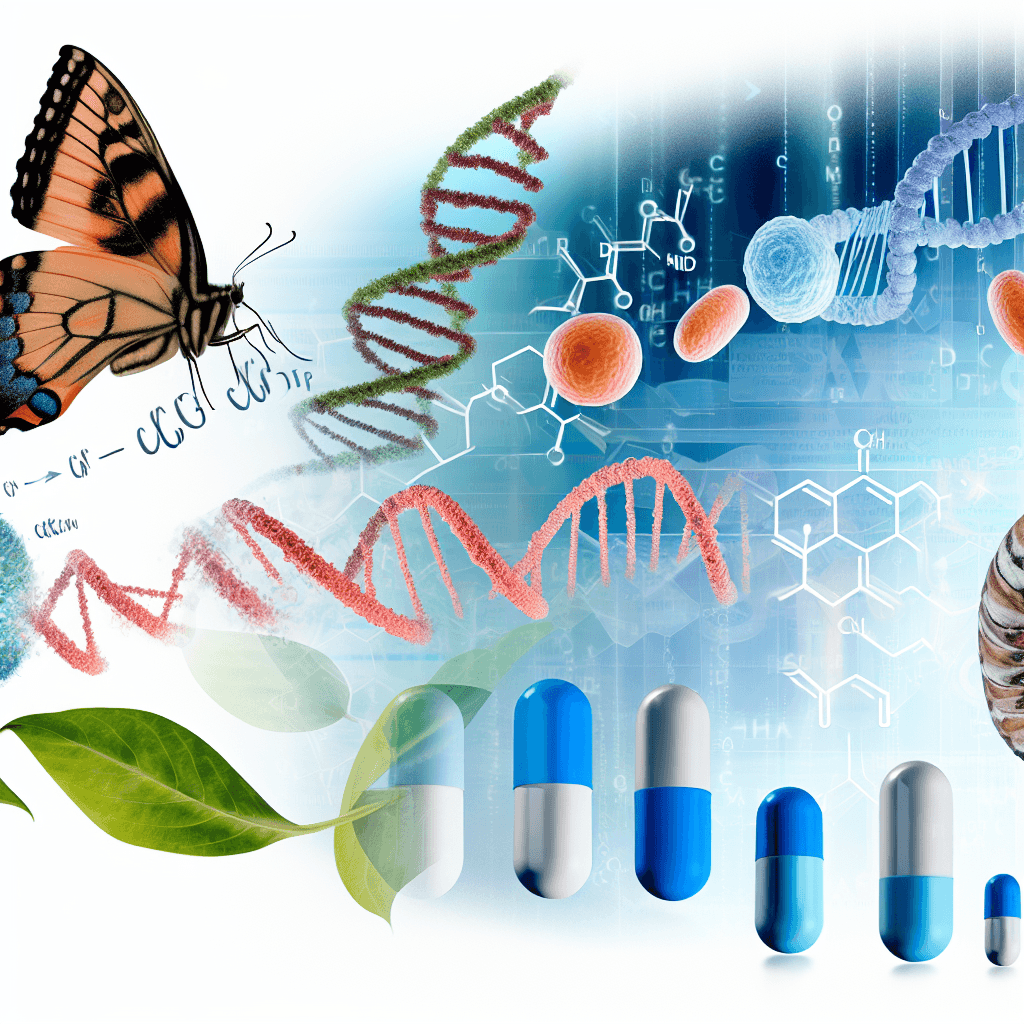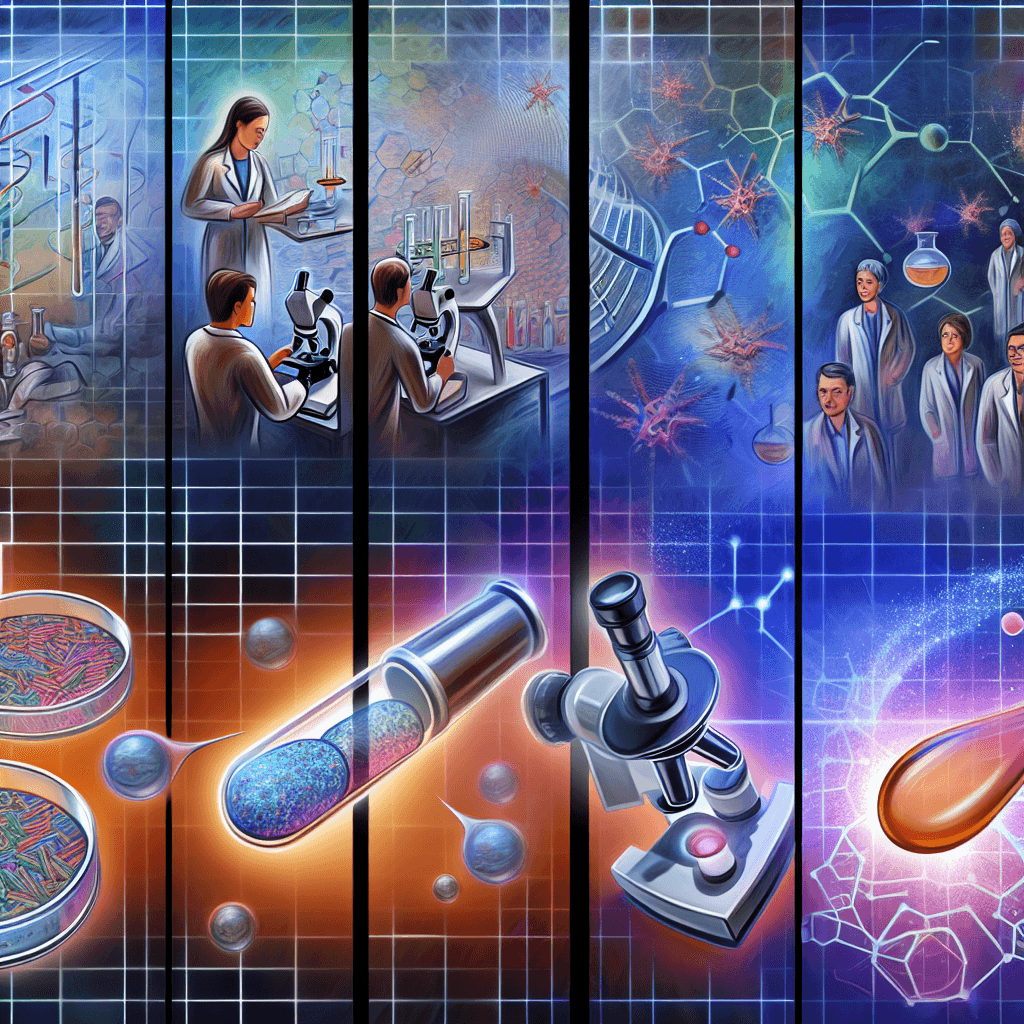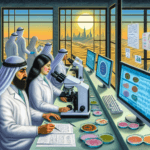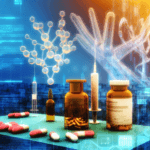Discover how life sciences research is revolutionizing drug discovery, leading to more effective treatments and improved patient outcomes.
How Life Sciences Research is Transforming Drug Discovery

Table of Contents
“Unlocking the secrets of life to revolutionize medicine: The power of life sciences research in drug discovery.”
Introduction
Life sciences research has been at the forefront of transforming drug discovery in recent years. With advancements in technology and a deeper understanding of biological processes, scientists are now able to develop more effective and targeted drugs to treat a wide range of diseases. This has led to a significant shift in the drug discovery process, making it more efficient and precise. In this introduction, we will explore how life sciences research is revolutionizing drug discovery and the potential impact it can have on improving human health.
The Role of Artificial Intelligence in Drug Discovery
The field of drug discovery has been revolutionized by advancements in life sciences research. With the help of cutting-edge technologies and techniques, scientists are now able to identify potential drug targets and develop new treatments at a faster pace than ever before. One of the key players in this transformation is artificial intelligence (AI), which has become an integral part of the drug discovery process.
AI refers to the simulation of human intelligence in machines that are programmed to think and learn like humans. In drug discovery, AI is used to analyze vast amounts of data and make predictions about potential drug candidates. This technology has the potential to significantly speed up the drug discovery process, reduce costs, and improve the success rate of drug development.
One of the main applications of AI in drug discovery is in target identification. Identifying the right target is crucial in developing effective drugs. Traditionally, this process has been time-consuming and costly, as it involves screening thousands of potential targets. However, with the help of AI, scientists can now analyze large datasets and identify potential targets with a higher degree of accuracy and efficiency.
AI is also being used in the early stages of drug development, where it can help predict the efficacy and safety of potential drug candidates. By analyzing data from previous clinical trials and drug interactions, AI algorithms can identify patterns and make predictions about the potential success of a drug. This can save pharmaceutical companies millions of dollars in failed drug trials and help them focus on the most promising candidates.
Another area where AI is making a significant impact is in drug repurposing. This refers to the process of identifying new uses for existing drugs. With the help of AI, scientists can analyze large databases of drug compounds and identify potential candidates for repurposing. This not only saves time and resources but also allows for the development of new treatments for diseases that currently have no effective treatment options.
In addition to speeding up the drug discovery process, AI is also helping to make it more efficient. By automating certain tasks, such as data analysis and prediction, AI allows scientists to focus on more complex and creative aspects of drug development. This can lead to the development of more innovative and effective treatments.
One of the most significant advantages of using AI in drug discovery is its ability to handle large and complex datasets. With the increasing availability of data from various sources, such as genomics, proteomics, and clinical trials, it has become essential to have a technology that can analyze and make sense of this vast amount of information. AI algorithms can quickly process and analyze this data, identifying patterns and relationships that would be impossible for humans to detect.
However, like any technology, AI also has its limitations. One of the main challenges is the lack of transparency in the decision-making process. AI algorithms are often considered “black boxes,” meaning that it is challenging to understand how they arrive at their predictions. This can be a concern for regulatory agencies and can hinder the adoption of AI in drug discovery.
In conclusion, the role of AI in drug discovery cannot be overstated. This technology has the potential to transform the way we develop new treatments and improve the lives of millions of people. With its ability to analyze vast amounts of data, make predictions, and automate tasks, AI is helping scientists to identify potential drug targets, develop new treatments, and repurpose existing drugs. However, it is essential to address the challenges and limitations of AI to ensure its responsible and ethical use in drug discovery.
Advancements in Genomics and Precision Medicine for Targeted Therapies

The field of drug discovery has undergone a significant transformation in recent years, thanks to advancements in life sciences research. One of the most significant developments has been in the area of genomics and precision medicine, which has paved the way for targeted therapies that are tailored to individual patients. This has revolutionized the way we approach drug development and has the potential to greatly improve patient outcomes.
Genomics, the study of an organism’s complete set of DNA, has played a crucial role in this transformation. With the completion of the Human Genome Project in 2003, scientists gained a better understanding of the genetic makeup of humans. This breakthrough has allowed researchers to identify genetic variations that may contribute to the development of diseases and to design drugs that target these specific genetic mutations.
One of the most significant applications of genomics in drug discovery is in the field of cancer treatment. Cancer is a complex disease, and traditional chemotherapy treatments often have severe side effects due to their non-specific nature. However, with the use of genomics, researchers can now identify specific genetic mutations that drive the growth of cancer cells. This has led to the development of targeted therapies that can selectively attack these mutations, leaving healthy cells unharmed.
Precision medicine, also known as personalized medicine, takes this concept even further. It involves tailoring treatments to individual patients based on their genetic makeup, lifestyle, and environment. This approach recognizes that each person’s genetic profile is unique, and what works for one individual may not work for another. By using precision medicine, doctors can prescribe the most effective treatment for a patient’s specific condition, leading to better outcomes and fewer adverse effects.
One example of precision medicine in action is the use of pharmacogenomics, which studies how an individual’s genetic makeup affects their response to drugs. By analyzing a patient’s genetic profile, doctors can determine which medications are most likely to be effective and which may cause adverse reactions. This information can help prevent trial and error in finding the right treatment and can also reduce the risk of adverse drug reactions.
Another area where genomics and precision medicine have made significant contributions is in rare diseases. These are conditions that affect a small percentage of the population and often have no known cure. With the use of genomics, researchers can identify the genetic cause of these diseases and develop targeted therapies to treat them. This has given hope to patients and their families who previously had limited treatment options.
The advancements in genomics and precision medicine have also had a significant impact on the pharmaceutical industry. Drug companies are now investing heavily in these areas, recognizing the potential for targeted therapies to be more effective and profitable. This has led to collaborations between pharmaceutical companies and research institutions, resulting in a more collaborative and innovative approach to drug discovery.
However, there are still challenges to overcome in the field of genomics and precision medicine. One of the main obstacles is the high cost of genetic testing and personalized treatments. As technology advances and becomes more accessible, it is hoped that these costs will decrease, making these treatments more widely available.
In conclusion, the advancements in genomics and precision medicine have transformed the landscape of drug discovery. By understanding the genetic basis of diseases and tailoring treatments to individual patients, we are moving towards a more personalized and effective approach to healthcare. With continued research and development in this field, we can expect to see even more targeted therapies and improved patient outcomes in the future.
Utilizing Big Data and Machine Learning in Drug Development
The field of drug discovery has undergone a significant transformation in recent years, thanks to advancements in life sciences research. With the help of big data and machine learning, drug development has become more efficient and effective, leading to the discovery of new treatments for various diseases.
Big data refers to the vast amount of information that is generated and collected in various fields, including healthcare. This data includes patient records, genetic information, clinical trial results, and more. In the past, this data was often underutilized due to the lack of technology and resources to analyze it effectively. However, with the development of advanced computing tools and techniques, big data has become a valuable resource in drug discovery.
One of the main ways big data is utilized in drug development is through the identification of potential drug targets. Drug targets are specific molecules or proteins in the body that can be targeted by a drug to treat a disease. Identifying these targets is a crucial step in the drug discovery process, and big data has made it easier and more efficient.
Through the analysis of large datasets, researchers can identify patterns and correlations that may not be apparent through traditional methods. This allows them to pinpoint potential drug targets and prioritize them based on their relevance and potential for success. This approach has led to the discovery of new drug targets for diseases such as cancer, Alzheimer’s, and diabetes.
Another way big data is transforming drug discovery is through the use of predictive modeling. With the help of machine learning algorithms, researchers can analyze large datasets and predict the effectiveness of a drug candidate before it even enters clinical trials. This not only saves time and resources but also reduces the risk of failure in later stages of drug development.
Machine learning algorithms can also be used to analyze data from previous clinical trials and identify factors that may have contributed to the success or failure of a drug. This information can then be used to design more effective clinical trials and increase the chances of success in future drug development.
In addition to improving the drug discovery process, big data and machine learning are also revolutionizing personalized medicine. Personalized medicine is an approach that takes into account an individual’s genetic makeup, lifestyle, and environment to tailor treatments specifically for them. With the help of big data, researchers can analyze vast amounts of genetic data and identify genetic markers that may be linked to certain diseases. This information can then be used to develop personalized treatments that target these specific genetic markers.
Furthermore, big data is also being used to improve the efficiency of clinical trials. By analyzing data from previous trials, researchers can identify potential participants who are more likely to respond positively to a particular treatment. This not only speeds up the recruitment process but also increases the chances of success in clinical trials.
However, with the use of big data and machine learning in drug development, there are also challenges that need to be addressed. One of the main concerns is the privacy and security of patient data. As more and more data is collected and shared, there is a risk of sensitive information falling into the wrong hands. Therefore, strict regulations and protocols must be in place to protect patient privacy.
In conclusion, the utilization of big data and machine learning in drug development has transformed the field of drug discovery. It has made the process more efficient, effective, and personalized, leading to the discovery of new treatments for various diseases. However, it is essential to address the challenges and ethical concerns that come with the use of big data to ensure its responsible and ethical use in drug development.
Emerging Technologies in Life Sciences Research: CRISPR and Gene Editing
The field of life sciences research has been rapidly evolving in recent years, thanks to the emergence of new technologies that are transforming the way we approach drug discovery. One of the most groundbreaking technologies in this field is CRISPR, which stands for Clustered Regularly Interspaced Short Palindromic Repeats. This technology has revolutionized the field of gene editing and has the potential to greatly impact the development of new drugs.
CRISPR was first discovered in bacteria as a defense mechanism against viruses. It consists of a protein called Cas9 and a guide RNA that directs the Cas9 to a specific location in the genome. Once at the desired location, the Cas9 cuts the DNA, allowing for precise editing of the genetic code. This technology has been adapted for use in various organisms, including humans, and has opened up a world of possibilities for researchers.
One of the most significant applications of CRISPR in drug discovery is its ability to target and edit disease-causing genes. This has the potential to treat a wide range of genetic disorders, including those that were previously considered untreatable. For example, in 2017, the FDA approved the first gene therapy using CRISPR for the treatment of a rare form of inherited blindness. This breakthrough has given hope to many patients and their families who previously had no treatment options.
In addition to treating genetic disorders, CRISPR is also being used to study the function of genes and their role in disease. By editing specific genes in cells or animal models, researchers can observe the effects and gain a better understanding of how these genes contribute to disease. This knowledge can then be used to develop new drugs that target these genes and their associated pathways.
Another exciting application of CRISPR in drug discovery is its potential to create more accurate disease models. Traditional methods of studying diseases involve using animal models or cell lines that may not accurately reflect the complexity of human diseases. With CRISPR, researchers can create genetically modified animal models that closely mimic human diseases, allowing for more accurate testing of potential drugs.
Furthermore, CRISPR has the potential to speed up the drug discovery process. Traditional methods of drug development can take years and cost millions of dollars. With CRISPR, researchers can quickly and efficiently edit genes to create disease models, test potential drugs, and identify promising candidates for further development. This not only saves time and money but also increases the chances of success in clinical trials.
While CRISPR has shown great promise in drug discovery, it is not without its challenges. One of the main concerns is off-target effects, where the Cas9 protein may accidentally cut DNA at unintended locations. This could lead to unintended consequences and potential safety issues. However, researchers are continuously working to improve the precision of CRISPR and minimize off-target effects.
In addition to CRISPR, other emerging technologies in life sciences research are also transforming drug discovery. For example, advances in single-cell sequencing technology have allowed researchers to study individual cells and their genetic makeup, providing a more detailed understanding of diseases at the cellular level. This information can then be used to develop targeted therapies that are more effective and have fewer side effects.
In conclusion, CRISPR and other emerging technologies in life sciences research are revolutionizing drug discovery. From treating genetic disorders to creating more accurate disease models and speeding up the drug development process, these technologies have the potential to greatly impact the future of medicine. While there are still challenges to overcome, the possibilities are endless, and we can expect to see many more breakthroughs in the field of drug discovery thanks to these innovative technologies.
Q&A
1. What is life sciences research?
Life sciences research is a broad field that encompasses the study of living organisms and their interactions with the environment. It includes various disciplines such as biology, genetics, biochemistry, and biotechnology, among others.
2. How is life sciences research transforming drug discovery?
Life sciences research has greatly advanced drug discovery by providing a deeper understanding of the biological processes involved in diseases and the mechanisms of action of potential drugs. This has led to the development of more targeted and effective treatments, as well as the discovery of new drug candidates.
3. What are some examples of how life sciences research has impacted drug discovery?
One example is the use of genetic engineering and gene editing techniques to create more precise and personalized treatments for diseases. Another example is the use of high-throughput screening methods to quickly identify potential drug candidates from large libraries of compounds.
4. What are some challenges facing life sciences research in drug discovery?
Some challenges include the high cost and time-consuming nature of research and development, as well as the ethical considerations surrounding the use of animals and human subjects in research. Additionally, the complexity of diseases and the need for interdisciplinary collaboration can also pose challenges in drug discovery.
Conclusion
In conclusion, life sciences research has greatly transformed the field of drug discovery. With advancements in technology and a deeper understanding of biological processes, scientists are able to identify and target specific disease-causing molecules, leading to the development of more effective and precise drugs. This has not only accelerated the drug discovery process, but also improved the success rate of new drug candidates. Additionally, the use of big data and artificial intelligence has revolutionized the way drugs are designed and tested, making the process more efficient and cost-effective. Overall, life sciences research continues to play a crucial role in transforming drug discovery and ultimately improving human health.








